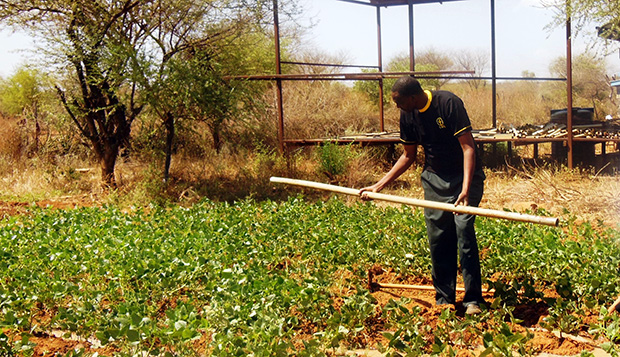
Demonstration garden in Kenya, where CWS is improving year-round water access in arid and semi-arid locations. Photo: CWS
What’s the one thing that can connect food security, education, peace, security and sustainable development? You will agree with me, that it must be water. However, as we mark World Water Day, we must remember that globally over half a billion people do not have access to clean water. This is quite depressing!
To tackle this global water crisis, CWS together with its implementing partners have been assisting water-stressed and marginalized communities in in the arid regions of East Africa to develop innovative, cost-effective and environmentally sound water systems, including Sand Dams, Shallow Wells, Boreholes and Rock Catchments.
Even with a ravaging drought underway – declared as a national disaster in some countries such as Kenya – success stories demonstrate that with CWS support, communities can harness the transformative power of water for individual and community wellbeing.
A case in point is the Kadokoi community in West Pokot County in Kenya. Throughout the Water for Life project implementation zone, there is secure access to water; with a marked decrease in the distance travelled to water sources. This greatly saves women and girls from the burdens associated with water collection. The community has not only enhanced its food security, through drip irrigation, its members could also sell their surplus for increased household income.
Water is also the change catalyst behind the various entrepreneurial activities in the area, which have empowered women to challenge the age-old patriarchal norms and practices. Overall, there is increased diversification of economic activities and even setting up of new institutions such as schools; along with a marked increase in enrollment and retention of children.
In the words of John Nabaiye, the Kadokoi water management committee chairman: “Water holds a great potential to alleviating the poverty and hunger that our community has long suffered from.”
Importantly, the supported communities are also making headway in terms of enhanced peace and security in a once conflict prone area. In an interview with CWS, Miriam Sebei, the area local administrator, noted: “Water has helped strengthen community relations around here; we have witnessed relative peace ever since the water project was set up in 2008.”
It is worth noting is that, for optimal results, communities have organized water management committee whose members are not only tasked with sustainable management and utilization of water resources, but also to serve as a platform for addressing community challenges and coming up with collective solutions.
For more details on CWS Water and WASH activities, see the recent external evaluation report of our Water for Life program: http://bit.ly/2f9vnr9
Caleb Wafula, Program Development Assistant, CWS Africa
